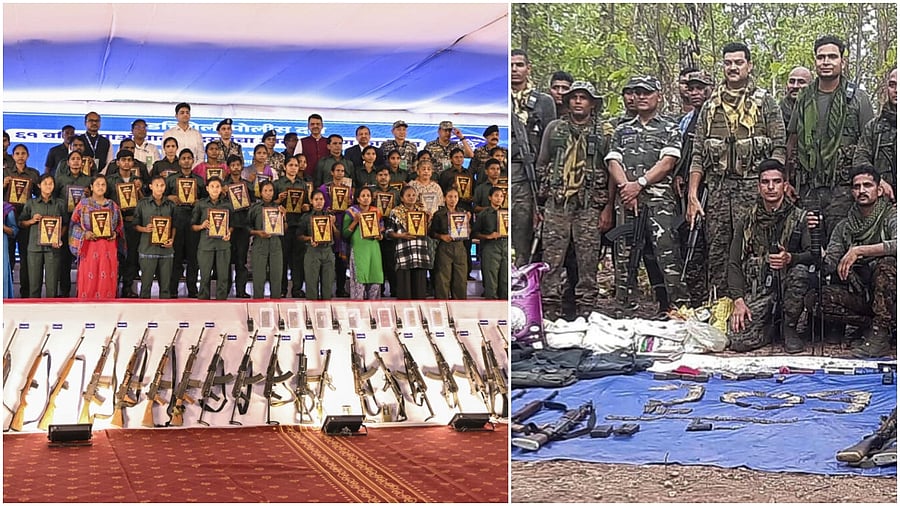
File image of security forces after a Naxal encounter(L), Senior Naxal leader Mallojula Venugopal Rao along with 60 other cadres surrendered before Maharashtra CM Fadnavis, in Gadchiroli
Credit: PTI Photos
Hyderabad: The outlawed CPI (Maoist) organisation and the wider Naxal movement in India already reeling under sustained security operations over the past year has suffered a major setback with the surrender of one of its seniormost and prominent leader, Mallojula Venugopal Rao (69), before Maharashtra Chief Minister Devendra Fadnavis on Wednesday.
Alongside Venugopal Rao, nearly 60 middle and senior-level cadres of the party also surrendered, handing over a substantial cache of weapons. Known by several aliases Abhay, Bhupathi, Sonu and Master Rao, Venugopal has long been regarded as one of the key ideological figures within the Maoist movement.
In recent months, he has publicly called for the renunciation of armed struggle, urging Maoist cadres to abandon violent operations and join the mainstream. While several factions within the CPI (Maoist) supported Bhupathi’s reformist stance, a few committees openly opposed it. Intelligence sources indicated to DH that hundreds of cadres are expected to follow his lead and surrender in the coming days.
This wave of surrenders comes in the wake of the killing of Nambala Keshav Rao, alias Basava Raj, during Operation Kagaar on May 21 a watershed moment in India’s counter-insurgency history. It marked the first neutralisation of such a high-ranking Naxalite leader in decades. Following his death, Tippiri Tirupati, a Madiga Dalit from Telangana, was appointed as the party’s general secretary.
With Tirupati now at the helm and the Central Committee reduced to a single-digit membership, the Maoist organisation finds itself at its weakest point in decades. To assist Tirupati, only one other senior commander, Madvi Hidma, remains active. Apart from these two, the Naxal movement has lost almost all its prominent and influential leaders.
According to intelligence agencies, Ashanna, also known as Rupesh, who is believed to be operating from the dense Abujhmadh forests in Chhattisgarh and leading guerrilla operations across central India, has also decided to surrender before the Chhattisgarh police.
Born in Polonipalli village of Warangal now Mulugu district in Telangana, Ashanna’s original name is Takkalapalli Vasudeva Rao. Hailing from a middle-class Velama family, he earned a reputation as a master tactician and bomb-maker with a remarkable ability to evade security forces, even during high-intensity crackdowns.
Currently a CPI (Maoist) Central Committee member, Ashanna is said to be preparing to surrender along with nearly 70 cadres from Chhattisgarh, accompanied by another cache of arms. His wife, Narla Sri Vidya alias Karuna, a senior Maoist cadre, was arrested in Hyderabad in July 2025.
“The conditions in India that once favoured an armed struggle based on the revolutionary people’s war approach have long since disappeared. Although belatedly, it has now been over a month since the party’s Politburo member announced the decision to renounce armed struggle. Under the leadership of Comrade Abhay, about 60 members including State Division Committee members have joined the mainstream while committing themselves to raising public awareness and mobilising people for equality and the cause of communism. This development is something society should welcome,” said G Narasimha Reddy alias Jampanna, who spent 35 years underground and served as a CPI (Maoist) Central Committee member for 17 years.
In recent years, Venugopal Rao faced increasing isolation within the party for advocating a pause in armed conflict and exploring the possibility of laying down arms a stance dismissed by the Central Committee as his personal opinion.
“This eventually culminated in his surrender with a group of cadres in Maharashtra, reflecting deep internal strife and ideological crisis within the organisation,” said a former senior intelligence official, who spent over three decades in anti-Naxal operations in Andhra Pradesh.
“Venugopal played a pivotal role in expanding Maoist influence in regions like Gadchiroli and was the ideological architect behind several strategic and communication frameworks of the party. His exit marks a defining moment for the movement — underscoring the personal toll of decades underground, and the declining unity and ideological appeal of Maoism in contemporary India,” the former official told DH.